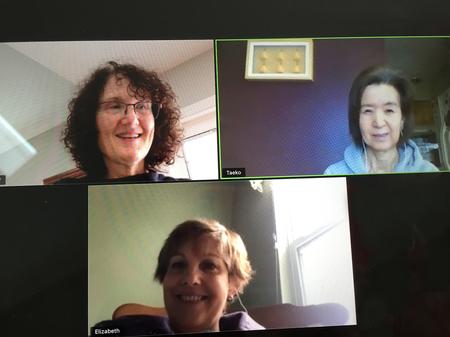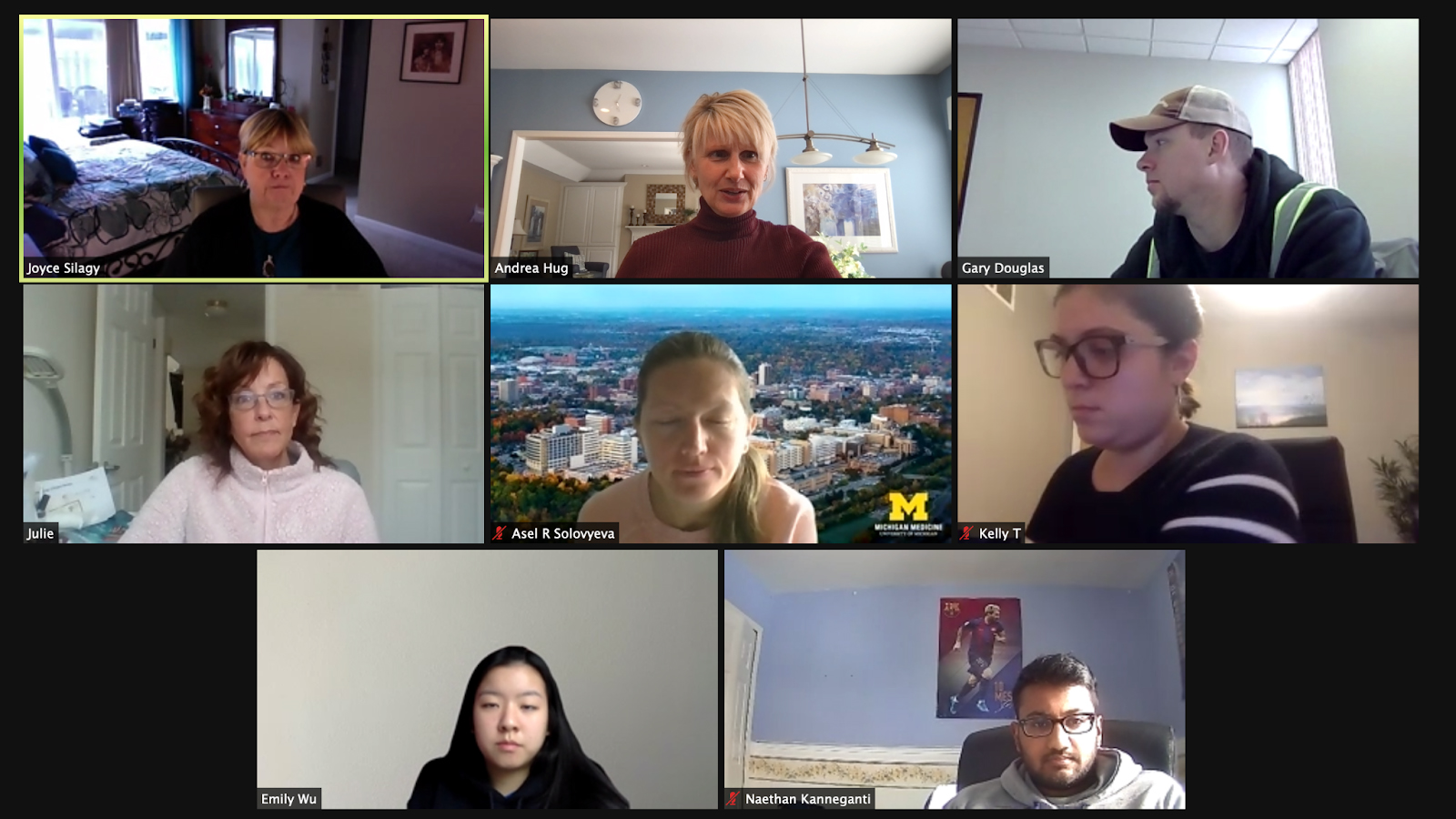English Language Learner Program Helps Canton Residents Connect From Around the World
The Plymouth-Canton Community Literacy Council has shifted to online learning during the pandemic, providing a space for conversation.

This story is part of WDET’s Crossing the Lines: Canton Battles COVID series, reconnecting listeners with the people they met and issues they discovered during WDET’s 2019 Crossing the Lines Canton. Now, two years later, explore how the township of Canton has fared during the coronavirus pandemic and examine how the lives of residents have changed over the past year.

As the pandemic upended normal life for millions of Michigan residents, English language learners faced new challenges in a rapidly changing world.
Navigating health care guidance, government orders, even radio broadcasts can be daily obstacles for many in Canton, where nearly one in four families speak a language other than English at home. Yet, many are managing to stay connected.
A couple of times a week, Khojasteh Tadayon logs on to Zoom to meet with her tutor, Stan Goldberg. She really enjoys American history. And during a recent session, they’re learning about Watergate.
“… so that’s bribing and he was involved in that,” Stan explains, as they go over a reading assignment.
“The fee for being silent,” Khojasteh replies, thinking for a moment.
“It is not good action for a president!”
“When I was in my country, I feel I am in the United States because I see my friends, I see the tutors. … They do the best thing to help us.” –Khojasteh Tadayon, English Language Learner on the conversations via Zoom
They both share a laugh.
For Khojasteh, who was born and raised in Iran, lessons like this help her better understand the country she lives in now.
“Sometimes when I was young and I studied in high school, we’d have a lesson about the history,” Khojasteh explains. “But sometimes we’d have a small summary about the United States.”
Khojasteh started from the beginning, learning the long history of Native Americans before the arrival of Christopher Columbus and why turkey is so important to Thanksgiving.
“I understand that one of the rules is that everybody is equal. It is very good,” Khojasteh says about the founding documents of the United States — like the Declaration of Independence and the Constitution. “But sometimes it doesn’t happen.”
“It is good because it is the idea. It is the first idea. It is the main idea,” she adds.
‘One of the Main Goals in My Life’
A lot of Khojasteh’s questions about America are tied to her first experiences with the country. She and her husband moved to Canton a few years ago to be with their son, who began working as an engineer at Ford. She’d split her year between Michigan and Tehran, where her other relatives and friends still live. But she had a lot of trouble traveling over the past few years because of the previous administration’s travel ban.
“Some rule from the past president. He imposed a law that people from [seven] countries can’t come to the United States,” Khojasteh explains. “It was hard for us because my country was one of those countries.”
Because of the travel ban, Khojasteh would spend hours on planes and at airports for her trips. And when she’d go through U.S. Customs, she found it difficult answering the border agents’ questions, because of her limited understanding of English.
“I like to be in the United States. I like American people. But it was hard for me,” Khojasteh says of the experience.
“Most of the time I’d say it is my fault and say, ‘Khojasteh, you should improve your English and don’t let the other people do the same thing with you,” she says.
“Improving my English is one of the main goals in my life.”

That’s how Khojasteh found out about the Plymouth-Canton Community Literacy Council. And the English language learner conversations, where she met her tutor, Stan Goldberg.
“I actually saw a little notice in the paper, saying they were going to do a tutor training,” says Stan, who’s been with the program for years. The retired social worker is a first-generation American.
“I owe a lot to this country. It gave my mother and father opportunities they could never have had, that we would never have had if they hadn’t come here,” Stan explains. “It was sort of a natural. How can I help somebody else? It just appealed to me.”
“It was just sort of in my DNA I guess,” he adds.
Stan and Khojasteh have learned together for a while. They used to meet in-person at the Canton Public Library for conversations. Dozens participated in the program before the pandemic. According to Plymouth-Canton Community Schools, there are at least 55 different languages spoken in the district.
Now, everything is online.
Conversation and Community
During the weekly Friday classes, a group of tutors and participants mingle in a Zoom video meeting. There are about a dozen people here today; it’s not as many as the Literacy Council used to get. Some people dropped off when the classes moved to Zoom, when working and teaching from home became the new normal. The new technology can be challenging for older users, too.
But for those who log on for the classes, the change has meant a safer way to socialize and a weekly conversation to look forward to, all at a click of a button.
The group starts by talking about one of the biggest issues of the day — vaccines. Then they move into smaller breakout rooms, where tutors and participants dive into the nuances of American English. Stan leads a lesson about all the different ways you can use the word “yank.”
“If someone is going to cross the street, but a car is too close, and you yank them?” asks one participant.
“Exactly, you pull the dog or the child back you grab them and yank them. Yeah, that’s a very good example,” Stan responds.
“I owe a lot to this country. … How can I help somebody else? It just appealed to me.” –Stan Goldberg, a retired social worker on tutoring English language learners
They take turns practicing the word and they discuss other phrases, too. One group went over a list of baseball idioms, like “on deck” or “keep your eye on the ball” and how to use them. They’re not formal grammar lessons, but rather exercises in conversation. And that’s something people need to use every day. As one participant puts it, even ordering food has some weird terms.
“Sometimes it’s too quick. Like in a restaurant they ask you, “soup or salad?” I always think that’s a ‘super salad.’ What’s a super salad?”
The group laughs at the observation. Everyone here has ties to Canton and Metro Detroit, but the English language learners come from all over the world. Brazil. Mexico. There’s even a woman who calls in from Japan, where it’s night time — she gets ready for bed while her neighbors are just starting their days.
Listen: How English language learners and tutors kept connected during the pandemic.
Khojasteh was in similar position at the beginning of the pandemic last year. She was in Iran when things went into lockdown. She and her husband were there for months. Khojasteh says continuing her lessons online kept her connected to Canton while she was stuck at home.
“When I was in my country, I feel I am in the United States because I see my friends, I see the tutors,” Khojasteh says of the Zoom classes. “Because they work very hard for people like me because there are a lot of different people from the other countries. They do the best thing to help us.”
Khojasteh says she wants to learn English for a lot of reasons. She’s applying for American citizenship, too. But she says she mainly just wants to be able to communicate with others in and outside of the U.S., and better know the world around her.
Trusted, accurate, up-to-date
WDET is here to keep you informed on essential information, news and resources related to COVID-19.
This is a stressful, insecure time for many. So it’s more important than ever for you, our listeners and readers, who are able to donate to keep supporting WDET’s mission. Please make a gift today.
